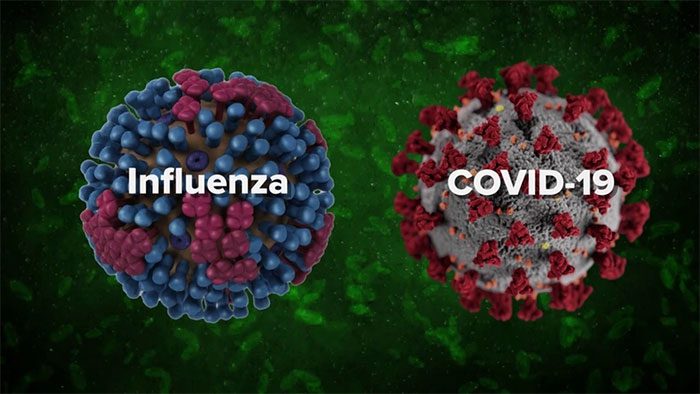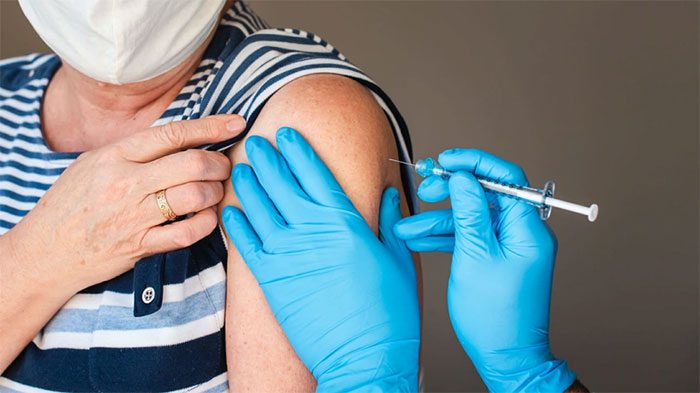The transition between seasons is a time when many types of viruses thrive, including SARS-CoV-2 and influenza. Particularly, being infected with both diseases simultaneously can lead to more severe symptoms.
With the emergence of SARS-CoV-2, people have become more aware of their health and well-being. However, respiratory illnesses like the common cold and influenza have started to be neglected. A significant number of people have overlooked the severity of the influenza virus and related issues.

The risk of co-infection with influenza and Covid-19 increases during the transition between seasons. (Photo: Cleveland Clinic).
However, as winter approaches, experts have warned that the risk of co-infection with influenza and Covid-19 may rise significantly.
Possibility of Co-infection
According to India Times, co-infection refers to the simultaneous infection of a host by two or more pathogens, meaning a person is infected with two or more diseases at the same time. In the United Kingdom and elsewhere in the world, many people have contracted both Covid-19 and influenza simultaneously, referred to as “dual epidemics.”
Steve Russell, Director of the National Health Service (NHS) in the UK, responsible for vaccination and screening, stated: “This winter may be the first time we see the impacts of what is called ‘dual epidemics’ with both Covid-19 and influenza circulating.”
Mr. Russell emphasized the importance of individuals who are at risk of severe illness from these viruses getting vaccinated to protect themselves and those around them.
“As the world opens up, public health measures are relaxed, and vaccination rates are not as high as needed, we will see the co-circulation of viruses like influenza and SARS-CoV-2, an increase in cases, and a burden,” said Maria Van Kerkhove, an official from the World Health Organization (WHO).

Co-infection is the simultaneous infection of a host by two or more pathogens. (Photo: WUSA9).
Symptoms to Watch For
Whether co-infected or not, it is crucial to be aware of the symptoms you may experience with each disease – Covid-19 and influenza.
For Covid-19, common symptoms include fever, cough, sore throat, headache, body aches, fatigue, and gastrointestinal issues. Loss of smell, taste, shortness of breath, and chest pain are less common symptoms.
Regarding influenza, a range of symptoms similar to those of Covid-19 can be observed, including fever, cough, sore throat, runny or stuffy nose, muscle or body aches, headache, and fatigue. Some individuals may experience vomiting and diarrhea, although this is more common in children than in adults.
Is it Safe to Get the Flu and Covid-19 Vaccines at the Same Time?
Due to the increasing number of co-infection cases of Covid-19 and influenza in the UK, the UK Health Security Agency (UKHSA) is urging everyone eligible for the free flu vaccine and Covid-19 booster to get vaccinated early.
International surveillance shows that H3N2 – a subtype of influenza A – is currently the most commonly detected influenza virus worldwide. H3N2 has recently caused a wave of infections in Southern Hemisphere countries like Australia, which has also experienced an early seasonal flu outbreak this winter.
This H3N2 strain circulated in the UK last winter but was largely controlled by Covid-19 restrictions, as people traveled less and worked from home. This helped protect individuals from influenza but also led to reduced levels of natural immunity to this strain.
Dr. Susan Hopkins, Chief Medical Advisor at UKHSA, stated: “We may be facing the threat of widespread influenza, with lower levels of natural immunity due to less exposure to this virus over the past three winters and the rise of Covid-19, with many variants that can evade immune responses. This combination poses a serious risk to our health, especially for those in high-risk groups.”

Getting the flu and Covid-19 vaccines is the best way to prevent both diseases. (Photo: McKnights).
Given the increasing risk of co-infection, it is important to get vaccinated for both types of vaccines as soon as possible. However, the question that arises is whether you can receive both vaccines at the same time.
According to the Centers for Disease Control and Prevention (CDC), it is perfectly normal to receive the flu and Covid-19 vaccines simultaneously. Similarly, the NHS also states that it is safe to receive the Covid-19 and flu vaccines concurrently.
However, these health agencies also note that it takes about two weeks after vaccination for the body to develop antibodies from both the Covid-19 and flu vaccines.
In addition to vaccination, wearing masks, maintaining social distance, avoiding crowds, and practicing hand hygiene are also key to preventing infections. Although the symptoms of Covid-19 have become milder, vigilance remains crucial. Individuals in high-risk groups are still vulnerable and may suffer severe illness from Covid-19 and influenza.



















































